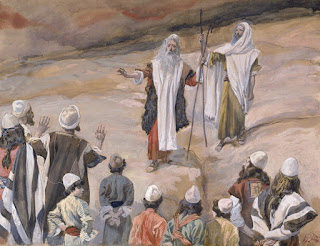Before moving to Egypt to escape the famine, Jacob, or Israel, had been living in Hebron, some 20 miles southwest of Jerusalem. This was where his grandfather, Abraham, was buried, as well as his father, Issac, and others of his ancestors. This was part of the Land of Canaan, the land that had been promised by the Lord to his grandfather and father, but a land currently occupied by other nations (Exodus 13:5).
During the 17 years that Israel lived in Egypt, after he moved his household there, before he died, he kept faith in the promise of the Lord to his father and grandfather that their descendants would eventually inherit the Land of Canaan. As he neared the end of his life, as he blessed his sons, including Joseph's sons, Ephraim and Manassah, Israel prophesied, "God shall be with you, and bring you again unto the land of your fathers" (Genesis 48:21).
Israel's son, Joseph, also prophesied that God would visit Israel and bring them out of Egypt and into the land God had promised to Abraham, Isaac, and Israel (Genesis 50:24). When Israel had died his son Joseph had seen to his burial in Hebron (Genesis 49:33, 50:1-13). So, with the promise of their fathers in their minds, and their fathers having been buried in Hebron, the sons of Israel lived and raised their children in Egypt, with the knowledge of the prophecies that they would eventually leave Egypt and go back to Hebron and the surrounding area. They themselves had promised to take Joseph's bones out of Egypt with them when they left (Genesis 50:25).
Some sixty-six people moved to Egypt with Israel to escape the famine. As time past, those 66 people grew into a nation, becoming enough people that the new rulers of Egypt, "which knew not Joseph", became worried. As the record states, "The children of Israel were fruitful, and increased abundantly, and multiplied, and waxed exceeding mighty; and the land was filled with them" (Exodus 1:7). So to keep them from overrunning the land, the Egyptians put taskmasters over them and enslaved the entire nation (Exodus 1:8-13). For 400 years the Israelites suffered and labored in bondage but they retained in memory the prophecies and promises of their fathers, of a promised land, they prayed for deliverance, they "sighed by reason of the bondage, and they cried, and their cry came up unto God by reason of the bondage" (Exodus 2:23) until the Lord sent Moses to deliver them. They also had the righteous teachings and traditions passed down to them from their fathers (Genesis 18:19). Exactly how large the nation had grown to is not clearly stated in the scriptures but scholars place the number in the hundreds of thousands.
The Lord sent Moses to Egypt, armed with an array of miracles to persuade the Egyptians to let the Israelites go. Moses first explained to the Children of Israel how the Lord would deliver them and the Israelites were willing to let Moses try but as the process unfolded the Children of Israel were sometimes impatient. When the Egyptians finally asked the Isralites to leave, the Children of Israel were happy to go but after they left and the trip proved to be difficult and trying, and the Israelites began complaining, even asking to go back into bondage (Exodus 14:10-12).
Each time they complained the Lord had a miraculous solution and still the Israelites complained at so many of the trials as they came (Exodus 15:24, 16:2-3, 17:2-3, 32:1, Numbers 14:2 (16:41), Deuteronomy 1:27).For example, after Jethro came out from Midian and met Moses in the wilderness (Exodus 18:1-12), Jethro saw the ordeal Moses endured as all the people brought all their problems and grievances to him to solve. In response to Jethro's inspired suggestion to appoint helpers, Moses sought to "provide out of all the people able men, such as fear God, men of truth, hating covetousness; and place such over them, to be rulers" (Exodus 18:21), Moses did just that. He sought out men so he could "teach them ordinances and laws, and ... shew them the way wherein they must walk, and the work that they must do" (Exodus 18:20). That Moses was able to find "able men out of all Israel, and [make] them heads over the people, rulers of thousands, rulers of hundreds, rulers of fifties, and rulers of tens" (Exodus 18:25) suggests that there were a significant number among the Children of Israel who were righteous enough to be what the Lord inspired Moses to look for.
It seems that a vocal minority can make it seem like everyone is complaining and murmuring, but behind the noise of the doubters was an army of faithful followers who trusted and helped the Lord and his prophet move the work forward and get Israel out of Egypt and into the Land of Promise.












No comments:
Post a Comment